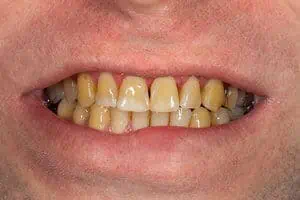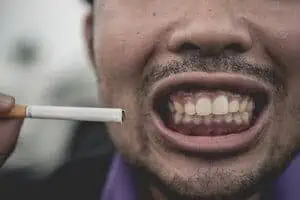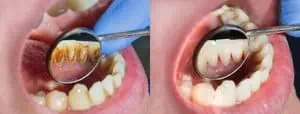How to Get Rid of Smoking Stains on Teeth Naturally
Dentaly.org is reader-supported. When you buy via the links on our site, we may earn an affiliate commission at no cost to you. Learn more.
If you're a regular smoker, you may be wondering what to do about your smokers' teeth. When you get yellow or brown stained teeth from smoking, the discolouration can be quite noticeable and hard to get rid of.

This is a pretty widespread oral health issue, affecting millions of people in the UK. Even if you don't smoke yourself, you likely know someone who does. In this article, we're going to look at why smokers' teeth get stained, and the other effects of smoking on teeth that you should be aware of.
And of course, if you're looking for a way to remove teeth stains caused by smoking, we have some recommendations for whitening solutions and other treatments.
Table of contents
- 1 What does smoking do to your teeth?
- 1.1 Does smoking cause tooth decay?
- 1.2 Smoking-induced tooth loss
- 1.3 Mouth cancer
- 1.4 If I quit smoking will my teeth get better?
- 1.5 Can a dentist tell if you smoke?
- 1.6 Smoking vs vaping
- 2 How to remove smoking stains from teeth
- 2.1 Professional teeth cleaning
- 2.2 Professional teeth whitening
- 2.3 Home whitening kits
- 2.4 Smokers' toothpaste
- 2.5 Home remedies for smokers' teeth
- 2.6 Summary of the best teeth whitening products for smokers
- 3 Conclusion
- 4 FAQs
- 4.1 How do I get rid of smokers' teeth?
- 4.2 How does nicotine affect your teeth?
- 4.3 How does smoking affect your mouth?
- 4.4 What are the best teeth whitening treatments for smokers?
What does smoking do to your teeth?
You already know that you can get stains on teeth from smoking. In fact, people who smoke are twice as likely to report tooth discolouration as those who don't. But, why are smoking teeth stains so distinctive?
Nicotine, a primary chemical substance in tobacco, becomes brown as soon as it comes into contact with oxygen. However, this chemical reaction that nicotine undergoes is not the only culprit behind smoking stains on teeth. The porous nature of the tooth enamel allows for the easy absorption of nicotine particles. This causes teeth to become discoloured, however, the staining is not uniform because of the process of inhalation. It's usually only the edges and gum lines that show significant discolouration.

That's the short version of the science behind smokers' teeth stains, and it explains why they can be so stubborn. Bad breath (halitosis) is another way that smoking affects oral health. But, did you know smoking is bad for teeth in other ways?
Does smoking cause tooth decay?
Nicotine causes a reduction in the flow of saliva, which promotes dry mouth symptoms. What this means is that in people who smoke, the saliva is not thick enough to offer the same degree of protection to teeth as in non-smokers. So, although smoking does not directly cause tooth decay, it affects the mouth's natural defence system and makes it harder for smokers to maintain optimal oral health.
For this reason, smokers are at greater risk of tooth decay and gum disease and should take extra care with their oral hygiene. Exposed tooth roots in teeth damaged by smoking can lead to heightened sensitivity too.
Smoking-induced tooth loss
Men who smoke are 3.6 times more likely to lose their teeth than those who don't, while for women that figure is 2.5 times. This is according to research from the University of Birmingham.
Why this increased likelihood of tooth loss from smoking? It comes back to the fact that people who smoke are more likely to develop gum disease, which is a major cause of tooth loss. It doesn't help that smoking lowers the amount of oxygen in the blood stream, making it harder for your gums to fight infection and heal themselves.
Another theory is that because smoking can mask gum bleeding, patients don't realise how serious the problem is until their teeth start to become loose or fall out. If you experience bleeding gums after quitting smoking, it could just be that smoking was covering up the problem.
Mouth cancer
Most Brits who smoke are well aware of the increased risk of lung cancer when they smoke, but there is less awareness of mouth and throat cancer.
This NHS publication states that people who smoke are six times more likely to develop cancer of the mouth, throat, tongue and lips than non-smokers. In fact, 90% of people who develop these types of cancer are current or former tobacco users.
If I quit smoking will my teeth get better?
Enough of all the doom and gloom, though. The good news is that quitting smoking can have a positive effect on your oral health straight away. And in 10-20 years' time, you may have the same chances of losing teeth or developing mouth cancer as someone who has never smoked.
However, some tooth damage from smoking is irreversible, so the sooner you stop, the better it'll be for your long-term oral health. In the short video below, a dentist explains the effects of smoking on teeth, and the benefits of quitting.
Smoking can effect your teeth, gums and oral health in several ways. In this short NHS film find out more, including about the rise of oral cancer. http://www.yorkshiresmokefree.nhs.uk If you're ready to quit, we're ready to help. Get in touch with our Yorkshire Smokefree NHS service for friendly and free help and advice. Film by http://www.deadlinedigital.co.uk
Can a dentist tell if you smoke?
The short answer to that is—absolutely!
People are often ashamed of their smoking habits and many lie to their dentists about it. However, there are some signs that might still give it away if you smoke:
- Stains on your teeth
- Unhealthy gums
- Smell of smoke and tobacco
The bottom line is, it's best not to lie to any medical professional about any habits that may negatively impact your health. But, don't let that put you off having regular dental checkups. If you smoke, it's especially important that your dentist can keep a close eye on your mouth and gum health.
Smoking vs vaping
We've established that smoking is bad for teeth, but what about e-cigarettes, or 'vaping'? There is no tobacco in e-cigarettes, so in some ways vaping is better for teeth than smoking. However, vapes still contain nicotine and some other ingredients which can harm teeth in different ways.
So, switching to vaping is probably a good thing for your teeth and overall health, but you may still notice your teeth staining. You should also still pay special attention to your oral hygiene and have regular checkups at the dentist.
How to remove smoking stains from teeth

So, we've looked at what smoking does to your teeth, but even after you've quit, some tell-tale signs can remain.
Tobacco smoking stains are often difficult to remove. Teeth enamel pores are filled with nicotine particles over years of active smoking and it is usually challenging to restore smokers' teeth to their former glory.
That being said, it is possible to remove stains from teeth caused by smoking, often with a combination of professional solutions and home remedies.
Ask a dentist: Can smokers' teeth be fixed?
The damaging effects of smoking are far-reaching and wreak havoc on your smile. If you are a regular smoker, you probably know exactly what I am talking about. But, it is never too late to make a change. A cosmetic dentist can repair the damage, so that even a lifelong smoker can have a beautiful, healthy smile.
Teeth whitening can greatly improve the appearance of stained teeth. However, if you are a long-time smoker porcelain veneers can make your smile as white as you want it. Also, dental implants can replace teeth lost due to smoking. Whatever your smile and health goals are, a dentist can help.
Dr. Shane S. Porter, Premier Dentistry of Eagle
Professional teeth cleaning
Probably the best way to remove smoking stains from teeth is to visit a dental hygienist for a scale and polish – especially if it's been a while since your last visit. Using special ultrasonic tools, they can dislodge a lot of the staining, as well as any tartar that has accumulated. See the transformation in the video below (no sound):
See the incredible before and after of one of our new patients who had her first visit to a dental hygienist. On the first visit she had the plaque removed and on the second visit she had a fine scale and polish. The results – we thought they were amazing. See if you agree. See https://www.bridgedentalsmiles.co.uk/treatments/dental-hygienist/ to book your next hygienist visit.
Professional teeth whitening
If some discolouration remains after a good cleaning, your dentist may recommend a whitening treatment.
The most effective smokers' teeth whitening solution is usually an in-office whitening treatment or professional teeth whitening course. These use a strong bleaching agent to penetrate the tooth surface and whiten nicotine stains.
Professional whitening is likely to yield good results, but it can also be really expensive.
Home whitening kits

If you want to try something more affordable, consider a home teeth-whitening kit. Because of the nature of nicotine stains, you may not end up with dazzling white teeth, but many whitening kits are effective at whitening smokers' teeth by at least a few shades.
One popular whitening kit is Smile Avenue. It uses gentle ingredients yet is tough on stains, even those caused by smoking. Plus, it's really easy to use for people who have never tried whitening their teeth before.
Read more about this and other good options in our guide to the best teeth whitening kits in the UK.
Smokers' toothpaste
If you've noticed that regular whitening toothpastes don't have much effect on your smoking-stained teeth, consider a special smokers' toothpaste. This anti-stain toothpaste from Clinomyn is a great choice because it also contains fluoride, which helps protect teeth from decay.
You could also try using Prophy Paste, which is the same product that hygienists use to polish teeth. It may not look like much, but a little goes a long way and delivers impressive results. Here are some of the rave reviews from people who wanted to remove stains from their teeth:

"Top product, it's what your dentist uses to clean your teeth up after every visit, I smoke, drink lots of tea but you wouldn't think so"
"Love this stuff. Got rid of tea stains and now use it regularly to keep my teeth stain free. Would recommend."
-Amazon reviewers
Do be aware that this is a tooth polish, not a toothpaste, and it's not advisable to use it every day because of its abrasive effect.
Home remedies for smokers' teeth
If you're trying to remove smoking stains from teeth on a tight budget, or prefer natural remedies, here are a few to try.
Baking soda and hydrogen peroxide
Baking soda (bicarbonate of soda) is widely used in dental whitening products, and it's easy to make your own bicarbonate of soda teeth whitening paste for smokers' teeth.
For this method, you just need to create a paste by adding 2-3 drops of hydrogen peroxide to a teaspoon of baking soda. Then apply the paste on your teeth and gently massage for 30 seconds, rinsing your mouth with water when finished. Use sparingly, as scrubbing too hard or using too frequently can wear down your teeth enamel.
Lemon juice
Lemon juice is acidic and can serve as a bleaching agent for your teeth. Regular rinsing of your mouth and teeth with a solution of lukewarm water and lemon juice could remove some tobacco and nicotine stains. Lukewarm water opens the enamel pores so that lemon juice can slightly penetrate the smoking stains. It is advised to rinse your mouth afterwards with cold water so that the enamel pores can close again. We recommend using lemon juice with caution as it can also erode your enamel if you are not careful.
Turmeric powder
The medicinal benefits of turmeric are well-known, but did you also know that turmeric can be used for teeth whitening? Brushing your teeth daily with a paste made from turmeric and water can also help improve staining from smoking.
Summary of the best teeth whitening products for smokers
If you want to remove stains from teeth caused by smoking, here's a summary of the best products and what they cost:
| Treatment type | Average cost | Effectiveness |
|---|---|---|
| Professional whitening | £150 - £1,500 depending on method | Most likely to fully remove smoking stains |
| Home whitening kits | £20 - £80 | Effective at minimising staining |
| Stain removal toothpaste | £3 - £15 | Can be abrasive on teeth |
| Natural remedies | £5 or less | Results will vary |
Conclusion
Smokers' teeth may be most recognisable because of the dark yellow or brown stains that build up on them, but there are numerous other oral health problems that come as a side effect of smoking.
If you have been smoking for many years then it can be difficult to remove smoking stains from your teeth. A trip to the dentist is a good place to start; they can give your teeth a professional cleaning and check your gum health. You may also have some success using a home whitening kit, special stain removal toothpaste, or another home remedy.
FAQs
How do I get rid of smokers' teeth?
To get rid of smokers' teeth, you can go in for professional cleaning and whitening at the dentist, purchase an at-home kit, or try natural remedies.
How does nicotine affect your teeth?
Nicotine has various adverse effects on oral health. Since it reduces saliva flow in the mouth, smokers' mouths don't have sufficient saliva to naturally protect teeth. This contributes to tooth decay, gum disease and eventually tooth loss from smoking.
How does smoking affect your mouth?
Smoking tobacco products can lead to major oral health issues like:
- Tooth decay and tooth loss
- Periodontal disease
- Oral cancer
- Complications after oral surgery like extractions
- Smoking stains on teeth
- Bad breath
What are the best teeth whitening treatments for smokers?
The best whitening treatments for smokers' teeth is usually one administered by a dentist. However, home whitening kits and smokers' toothpaste can also be effective at keeping stains at bay.
Smokers' Teeth: How to Remove Stains from Teeth Caused by Smoking
5 (100%) 1 vote[s]
How to Get Rid of Smoking Stains on Teeth Naturally
Source: https://www.dentaly.org/en/oral-health/smokers-teeth/


0 Response to "How to Get Rid of Smoking Stains on Teeth Naturally"
Post a Comment